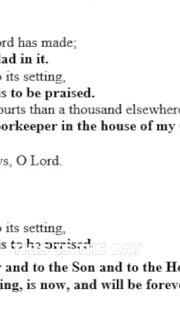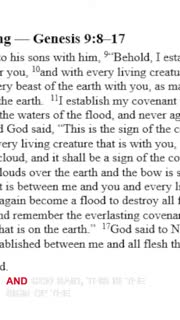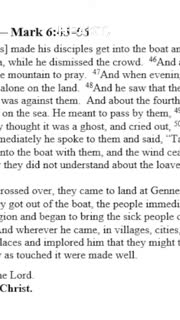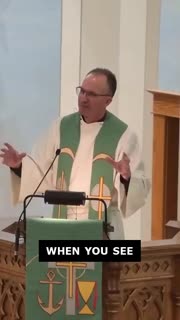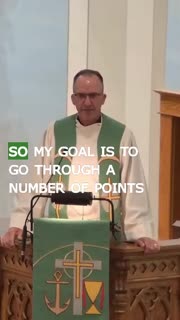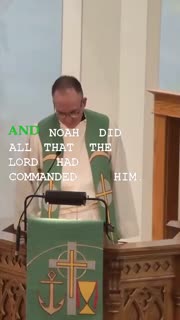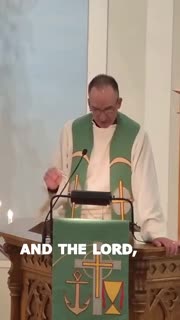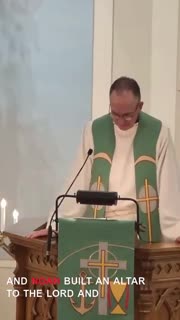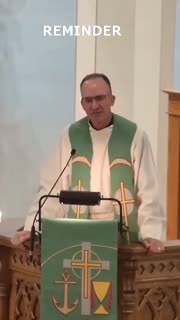God's Covenant: Mercy, Obedience, and New Beginnings
Devotional
Sermon Summary
Bible Study Guide
Sermon Clips
### Quotes for Outreach
1. "This is the day which the Lord has, has made from the rising of the sun to its setting. Better is one day in your courts than a thousand elsewhere. Make me to know your ways, O Lord. Sanctify us in your truth. From the rising of the sun to its setting. Glory be to the Father. Amen." [13:27] (43 seconds)
2. "And God said, This is the sign of the covenant that I make between me and you and every living creature that is with you for all future generations. I have set my bow in the cloud, and it shall be a sign of the covenant, between me and the earth." [17:59] (23 seconds)
3. "Take heart, it is I. Do not be afraid. And he got into the boat with them, and the wind ceased. And they were utterly astounded, for they did not understand about the loaves, but their hearts were hardened." [21:04] (19 seconds)
4. "When you see the rainbow, it's beautiful, couldn't wait to get home. I sped out the highway about two weeks ago, beautiful rainbow all the way across from our, it was driving out of the church parking lot, and there it was. You know, they don't last very long. I got to get out there and have Nancy step out and look at this. Most of it was still all there." [55:57] (17 seconds)
### Quotes for Members
1. "So my goal is to go through a number of points kind of quickly. You'll just have to hang with me, and they're not necessarily related to each other, other than that they're a part of the story of the flood. But at the end, then we are going to make a major point about the flood itself and how does that actually impact us today. What does the flood have to do with us today? How does that story, what God did, impact your faith, draw you closer to him, that sort of thing?" [30:33] (36 seconds)
2. "And Noah did all that the Lord had commanded him. That comes after almost a half a chapter. What God had commanded Noah was to build and to bring. So you get the section in there about 150 cubits and 300 cubits and 30 or 50 cubits tall and so forth. And God lays out blueprints for how Noah was supposed to build this ark. And then he tells them what he's supposed to bring. All the animals two by two and all the different kinds and different kinds. And it mentions that word three, four, times, probably something like species, you know. And it says, and Noah did all that the Lord had commanded him." [39:45] (37 seconds)
3. "And the Lord, shut him in. Now you've heard that verse many times. The Lord closes the door to the ship. The Lord shut him, Noah and his family in the ark. Why? Easy answer to protect him, to protect them. Okay. From what? Well, I asked my practical wife again, and she kind of looked at me like, is this a trick question? And she said from death. Okay. What else? How about from the assault of the people? Possibly. And one commentator I read, and also from the temptation to want to show mercy on those who were penitent, too late." [43:00] (45 seconds)
4. "And Noah built an altar to the Lord and took some of every clean animal and some of every clean bird and offered burnt offerings on the altar. Now, here's a verse you know. And when the Lord smelled the pleasing aroma, the Lord said, I will never again curse the ground because of man. When the Lord smelled the pleasing aroma. So what does that mean? Is that simply face value?" [47:43] (28 seconds)
5. "But let it be. Let it be a reminder of how God has finally dealt with the sin that is deep in our hearts. And of course, I'm talking about this simple thing that we call baptism. And this is not an add-on. This is not a Christian ritual that somebody invented 500 years ago. This is not I'm at the grocery store and I got my cart full, and now I'll throw in one of these things, the eye candy, the grabbers on the way out that they hope you spend more money on. Okay, we'll throw a little baptism into the Christian story." [53:50] (33 seconds)
Ask a question about this sermon
1. "This is the day which the Lord has, has made from the rising of the sun to its setting. Better is one day in your courts than a thousand elsewhere. Make me to know your ways, O Lord. Sanctify us in your truth. From the rising of the sun to its setting. Glory be to the Father. Amen." [13:27] (43 seconds)
2. "And God said, This is the sign of the covenant that I make between me and you and every living creature that is with you for all future generations. I have set my bow in the cloud, and it shall be a sign of the covenant, between me and the earth." [17:59] (23 seconds)
3. "Take heart, it is I. Do not be afraid. And he got into the boat with them, and the wind ceased. And they were utterly astounded, for they did not understand about the loaves, but their hearts were hardened." [21:04] (19 seconds)
4. "When you see the rainbow, it's beautiful, couldn't wait to get home. I sped out the highway about two weeks ago, beautiful rainbow all the way across from our, it was driving out of the church parking lot, and there it was. You know, they don't last very long. I got to get out there and have Nancy step out and look at this. Most of it was still all there." [55:57] (17 seconds)
### Quotes for Members
1. "So my goal is to go through a number of points kind of quickly. You'll just have to hang with me, and they're not necessarily related to each other, other than that they're a part of the story of the flood. But at the end, then we are going to make a major point about the flood itself and how does that actually impact us today. What does the flood have to do with us today? How does that story, what God did, impact your faith, draw you closer to him, that sort of thing?" [30:33] (36 seconds)
2. "And Noah did all that the Lord had commanded him. That comes after almost a half a chapter. What God had commanded Noah was to build and to bring. So you get the section in there about 150 cubits and 300 cubits and 30 or 50 cubits tall and so forth. And God lays out blueprints for how Noah was supposed to build this ark. And then he tells them what he's supposed to bring. All the animals two by two and all the different kinds and different kinds. And it mentions that word three, four, times, probably something like species, you know. And it says, and Noah did all that the Lord had commanded him." [39:45] (37 seconds)
3. "And the Lord, shut him in. Now you've heard that verse many times. The Lord closes the door to the ship. The Lord shut him, Noah and his family in the ark. Why? Easy answer to protect him, to protect them. Okay. From what? Well, I asked my practical wife again, and she kind of looked at me like, is this a trick question? And she said from death. Okay. What else? How about from the assault of the people? Possibly. And one commentator I read, and also from the temptation to want to show mercy on those who were penitent, too late." [43:00] (45 seconds)
4. "And Noah built an altar to the Lord and took some of every clean animal and some of every clean bird and offered burnt offerings on the altar. Now, here's a verse you know. And when the Lord smelled the pleasing aroma, the Lord said, I will never again curse the ground because of man. When the Lord smelled the pleasing aroma. So what does that mean? Is that simply face value?" [47:43] (28 seconds)
5. "But let it be. Let it be a reminder of how God has finally dealt with the sin that is deep in our hearts. And of course, I'm talking about this simple thing that we call baptism. And this is not an add-on. This is not a Christian ritual that somebody invented 500 years ago. This is not I'm at the grocery store and I got my cart full, and now I'll throw in one of these things, the eye candy, the grabbers on the way out that they hope you spend more money on. Okay, we'll throw a little baptism into the Christian story." [53:50] (33 seconds)
